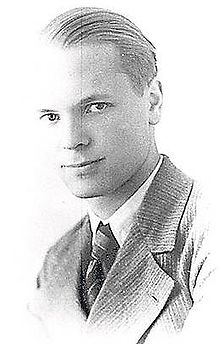- Maurice Bavaud
-
Maurice Bavaud 
Picture of Maurice Bavaud circa 1937Born Maurice Bavaud
January 15, 1916
SwitzerlandDied May 14, 1941 (aged 25)
Berlin-Plötzensee, Berlin, Nazi GermanyCause of death Execution by Guillotine Nationality Swiss Home town Neuchâtel, Switzerland Religion Roman Catholic Church Parents Alfred Bavaud
Hélène SteinerMaurice Bavaud (January 15, 1916 in Neuchâtel - May 14, 1941 in Berlin-Plötzensee) was a Roman Catholic Swiss citizen who in 1938 attempted to assassinate Adolf Hitler.
Contents
Background
Bavaud was a Catholic theology student, attending the Saint Ilan Seminary, Saint-Brieuc, Brittany, and a member of an anti-communist student group in France called Compagnie du Mystère. The group's leader, Marcel Gerbohay, had a lot of influence over Bavaud. Gerbohay claimed that he was a member of the Romanov Dynasty, and convinced Bavaud that when communism was destroyed, the Romanovs would once again rule Russia, in the person of Gerbohay. Bavaud believed what Gerbohay had told him, became obsessed with the idea that killing Hitler would help the plans to materialise, and finally decided to carry out the assassination himself.[1]
Attempts
On October 9, 1938, Bavaud travelled from Brittany to Baden-Baden, then on to Basel, where he bought a Schmeisser 6.35 mm (.25 ACP) semi-automatic pistol, and finally to Berlin. Upon arriving in Berlin, Bavaud discovered that Hitler was at Berchtesgaden, and travelled there.
A policeman, Karl Deckert, overheard Bavaud saying that he would like to meet Hitler personally. Deckert advised Bavaud that a private audience could be arranged if Bavaud could obtain a letter of introduction from a suitable foreign VIP. Deckert advised him to travel to Munich for the anniversary of the 1923 "Beer Hall Putsch", which Hitler attended every year. Bavaud followed those instructions by buying a ticket for a seat on the reviewing stand by posing as a Swiss reporter, intending to shoot Hitler as the latter passed during the parade. Bavaud abandoned this attempt when, on 9 November, Hitler turned out to be marching on the far side of the street rather than in the middle as he had expected, which put him out of range.
Bavaud next purchased expensive stationery and forged a letter of introduction in the name of the French nationalist leader Pierre Taittinger, which claimed that Bavaud had a second letter for Hitler's eyes only. He travelled to Berchtesgaden in the belief that Hitler had returned there, only to find that Hitler was still in Munich. When Bavaud returned to Munich, he discovered that Hitler was just leaving for Berchtesgaden.
Arrest and trial
Bavaud had exhausted his money and stowed away on a train to Paris, where he was discovered by a conductor who turned him over to the police. He was interrogated by the Gestapo and admitted his plans to assassinate Hitler.
Bavaud was tried by the Volksgerichtshof on December 18, 1938, naming as his motives that he considered Hitler a danger to humanity in general, to Swiss independence, and to Catholicism in Germany. Swiss diplomacy made no effort to save Bavaud; Hans Fröhlicher, the Swiss ambassador to Germany even publicly condemned Bavaud's assassination attempt. An offer from the Germans to exchange Bavaud for a German spy was turned down, and Bavaud was sentenced to death. He was executed by guillotine in the Berlin-Plötzensee prison on the morning of May 14, 1941.
Aftermath
Bavaud's father Alfred attempted to rehabilitate his son's name and reputation, resulting in a court decision on December 12, 1955 reverting the death sentence but posthumously condemning Bavaud to a five year sentence, arguing that Hitler's life was protected by law just as any other life. A second verdict of 1956 reverted the prison sentence and Germany paid Bavaud's family the sum of CHF 40,000 in reparation.
In 1976, Rolf Hochhuth idealized Bavaud as a "new William Tell", while in 1980 Klaus Urner relativized Hochhuth's heroic picture, analyzing psychological aspects of Bavaud's motivation. In 1989 and again in 1998, the Swiss Federal Council admitted that the Swiss authorities did not make a sufficient effort to save Bavaud. Finally, in 2008, the Swiss government honored the life and effort of Bavaud.[2]
See also
- Widerstand
Notes
References
- Peter Hoffmann, "Maurice Bavaud’s Attempt to Assassinate Hitler in 1938," Police Forces in History ed. George L. Mosse. SAGE Readers in 20th Century History Vol. 2. London/Beverly Hills 1975, p. 173–204.
- Roger Moorhouse, "Killing Hitler," Jonathan Cape, 2006. ISBN 0-224-07121-1
External links
- "Comité Maurice Bavaud"
- Maurice Bavaud in German, French and Italian in the online Historical Dictionary of Switzerland.
Categories:- 1916 births
- 1941 deaths
- People from Neuchâtel (city)
- People executed by decapitation
- Resistance members killed by Nazi Germany
- Executions at Plötzensee Prison
- Failed assassins of Adolf Hitler
- Civilians killed in World War II
- Swiss people executed abroad
- Swiss Roman Catholics
- Catholic resistance to Hitler
- People condemned by Nazi courts
Wikimedia Foundation. 2010.
